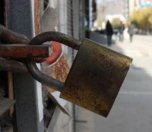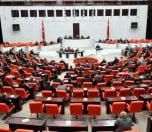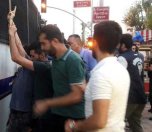Click to read the article in Turkish
Human Rights Watch (HRW) has issued a report today (October 12) pointing out that " people accused of terrorism or of being linked to the July 2016 attempted coup are at risk of torture in police custody" in Turkey.
In its 43-page report with the headline "In custody: Police Torture and Abductions" organization examined "ten cases in which security forces tortured or ill-treated a total of 22 people" and another case in which "police beat scores of villagers, 38 of whom lodged formal complaints of torture".
In addition to these 11 torture cases, the report also examines five individual cases of abduction that "likely amount to enforced disappearance by state authorities since March 2017.
Some highlights from the general part of the report are as follows:
Torture and ill-treatment
"The 11 cases of torture or ill-treatment Human Rights Watch includes in this report represent a fraction of the credible cases reported in the media and on social media. Such reports indicate that torture and ill-treatment in police custody in Turkey has become a widespread problem. Official figures show that in the past year well over 150,000 people have passed through police custody accused of terrorist offenses, membership of armed groups, or involvement in the attempted coup in July 2016. The highest number of detentions concerns people suspected of links with the group the government and courts in Turkey refer to as the Fethullahist Terror Organization (FETÖ), associated with US-based cleric Fethullah Gülen. The government says this group was behind the attempted coup. The second largest group concerns people with alleged links to the armed Kurdistan Workers' Party (PKK/KCK). Cases reported to Human Rights Watch show that it is people detained on these two grounds who are at greatest risk of torture.
"In all 11 cases of torture presented in this report, which altogether involve scores of individuals, Human Rights Watch gathered accounts of severe beatings, threats, and insults. Human Rights Watch heard accounts of detainees stripped naked, and in some cases of detainees being threatened with sexual assault, or being sexually assaulted. In many cases, the torture appeared to be aimed at extracting confessions or forcing detainees to implicate other individuals. Detainees who alleged torture were brought before doctors for routine medical reports, but either the doctors showed no interest in physical evidence of torture or the presence of police officers inhibited them from conducting proper medical examinations and made it hard for detainees to describe their injuries or speak about treatment in custody.
"In October 2016, Human Rights Watch published a report on the impact of the removal of safeguards against torture and ill-treatment under the state of emergency that was imposed in Turkey after the attempted coup. For example, the government extended the period of police detention to 30 days and restricted the right of detainees to meet with lawyers. The report documented incidents of torture that followed the introduction of these measures. In January 2017, the cabinet issued a decree lifting some of the most severe of these restrictions on detainees' rights. However, the evidence presented in this report indicates that in spite of the easing of restrictions on detainees' rights, the abuse of detainees in police custody has continued.
"Although the government of President Erdoğan publicly asserts a zero tolerance for torture, there remains a climate of impunity for the torture and mistreatment of detainees. Human Rights Watch is not aware of any serious measures that have been taken to investigate credible allegations of torture, much less hold perpetrators to account. Human Rights Watch discussed the cases of torture documented in its October 2016 report directly with the Turkish government. However, a year later, lawyers and families have informed Human Rights Watch that there has yet to be any sign that prosecutors have conducted effective investigations into two complaints by named individuals examined in the October report, or complaints by three individuals identified in the report by their initials.
"Several individuals whose cases are examined in this latest report also told prosecutors or courts they had been ill-treated. Most of their allegations appear to have been ignored or sidelined. There are scant indications that prosecutors are taking the initiative proactively to investigate abuse when they encounter suspects who show signs of having been subjected to ill-treatment.
"These developments should be seen in the context of the government's moves since the July 2016 coup attempt to further undermine the already compromised independence of the judiciary. Mass dismissals and prosecutions of judges and prosecutors over alleged Gülenist links and tighter executive control over the judiciary make it increasingly unlikely that prosecutors and judges concerned about their own job security will risk investigating such crimes".
Abductions and Enforced Disappearances
"This report also presents details of five cases of abductions which likely amount to enforced disappearances. In one case a man was abducted in Ankara and subsequently found in police custody, after having been held at a secret location for 42 days, during which time he alleges he was tortured. The facts of his case strongly indicate that he was the victim of an enforced disappearance, and was abducted and held in unacknowledged detention with at least the acquiescence of Turkish state agents.
"Human Rights Watch documented four other cases of people who were abducted in contexts that lead to the conclusion that they too should be presumed to be victims of enforced disappearances.
"Human Rights Watch has information about a sixth case – a man who went missing and was held at a secret place of detention for over two months before being released. We have not presented the details of the case in this report for the individual's own safety.
"In most of the cases of abduction documented, witnesses reported the victims were abducted in broad daylight in the street by men who declared to passersby they were from the police. In three cases the same type of vehicle, a VW Transporter, was used to abduct the men. In all cases, the relatives of the disappeared men had difficulty lodging formal complaints with the authorities or with receiving information about the investigation. In one case witnesses to the abduction told relatives they called the police, who said they could not intervene because the individual's apprehension seemed to have been handled by the anti-terror branch of the police.
"The evidence of abductions and likely enforced disappearances presented in this report is of particular concern because Turkey has a notorious history of security forces conducting enforced disappearances in the 1990s. The European Court of Human Rights issued repeated judgments that Turkey had violated the rights to liberty and security, and often the right to life of victims who were mainly Kurds, and had forced their families to endure inhuman and degrading treatment.
"In August, Human Rights Watch wrote an open letter to the minister of justice, seeking information about the status of investigations into four abductions, but had received no response at this writing. In several cases, families of victims have applied to the European Court of Human Rights, complaining of lack of an effective investigation into the abductions.
Constraints on Lawyers
"Despite the January 2017 reforms, several lawyers told Human Rights Watch that they had limited opportunity to speak to their clients in confidence because police officers were often present during their meetings with detainees. Under Turkey's Anti-Terror Law, lawyers' meetings with clients in police detention can be legally restricted for the first 24 hours. However, lawyers reported that in some cases the police still attempted to bar access beyond that period, forcing them to apply to the prosecutor's office to negotiate access.
"Some lawyers also reported that they had come under undue pressure from the police when they challenged official written police accounts of police interviews with their clients, at which they (the lawyers) had been present.
"Most lawyers interviewed by Human Rights Watch expressed concerns for their own safety. "Several commented that provincial bar associations and the Union of Turkish Bar Associations were not offering the support to lawyers they needed, and were not willing to support efforts to document and lodge complaints about detainees' allegations of ill-treatment. Without the institutional support of bar associations and the Union of Turkish Bar Associations to which they belong, the ability of lawyers to protect the human rights of detainees without fear of reprisals is limited.
"In November 2016, the government issued a decree under the state of emergency, closing down three Turkish lawyers' associations which had played an important role in promoting fair trial standards and the rights of detainees and defendants.
"Several hundred lawyers are in pre-trial detention, the majority accused of links to the group the government and courts in Turkey refer to as the Fethullahist Terror Organization (FETÖ).
Demands and recommendations
The Turkish authorities should urgently demonstrate their commitment to upholding the absolute prohibitions on torture, ill-treatment, and enforced disappearances, and ensure prompt and effective investigations into security forces, intelligence services, and all other public officials alleged to have tortured or ill-treated detainees, or unlawfully deprived them of their liberty. Turkey's international partners, including the European Union and its member states, should put human rights concerns at the center of their engagement with the Turkish authorities; raise with the Turkish authorities in the most urgent terms the increase in complaints of torture in police custody; and publicly call for full investigations into reported cases of torture and ill-treatment in detention, and of enforced disappearances.
Click to read the full report of HRW including the cases
(AS/DG)









